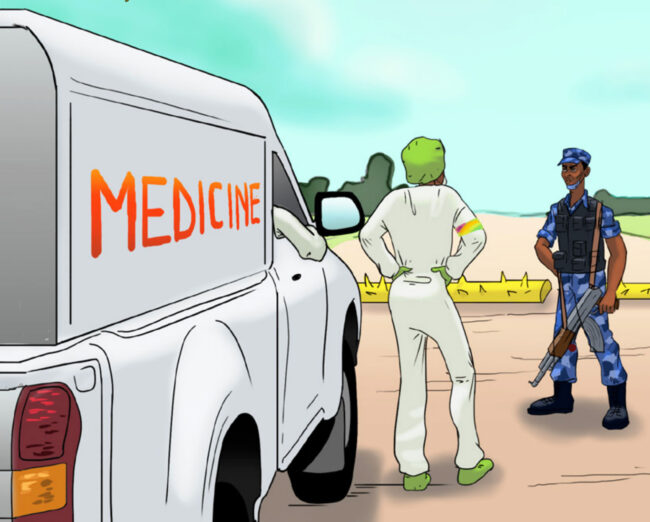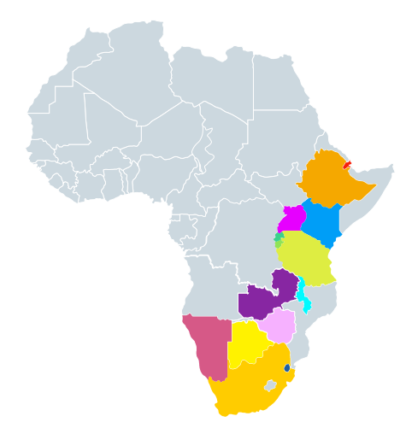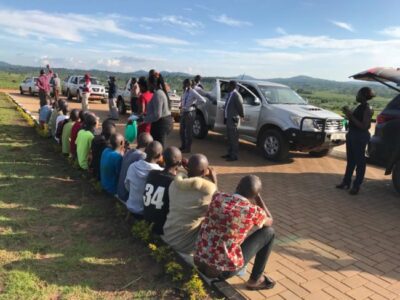Covid-19 has hurt LGBTIQ+ communities in east and southern Africa while also revealing weaknesses in the region’s LGBTIQ+ advocacy organisations, according to a new report from Pan Africa ILGA (PAI).

ILGA members representing Africa and other regions at an ILGA gathering.(Photo courtesy of ILGA)

Covid-19 lockdowns have interfered with delivery of medications needed by LGBTQI+ communities, as depicted in this illustration in the PAI report “Voices of Resilience in Uncertainty”.
Pan Africa ILGA (PAI) is the African regional affiliate of ILGA, the International Lesbian, Gay, Bisexual, Trans and Intersex Association.
PAI’s new report details the resilience of the LGBT community and the challenges they face during the Covid-19 era in eastern and southern Africa, underscoring the need for investment in strengthening organisations’ strategic and technical abilities to address contemporary challenges.
The report “Voices of Resilience in Uncertainty” highlights the Impact of COVID-19 on the LGBTIQ+ communities and their organisations in Botswana, Malawi, Namibia, South Africa, Eswatini, Zambia, Tanzania and Zimbabwe as well as in East African nations of Uganda, Burundi, Rwanda, Ethiopia and Kenya.
The report covers the period from mid-March 2020 (the intensive phase of most countries’ public health response) to April 2021, when communities were surveyed and engaged in a workshop representing 50 organisations from the two regions.
The report notes that LGBTIQ+ communities are experiencing the worst economic impacts of Covid-19 lockdown, including loss of income and lack of basic treatment adherence support for themselves and their household members.
“…… the enforcement of COVID-19 preventive measures had adverse effects on community organising across the ESA [Eastern and Southern Africa] region. For instance, the lockdown revealed significant gaps regarding the extent to which organisations had sufficient capacity to navigate any disruptions caused by COVID-19, such as a public health emergency.”

Countries surveyed in eastern and southern Africa
The report notes that many LGBTIQ+ organisations struggled to adapt their operations to the new normal and had to adopt trial-and-error strategies.
At first the organisations adjusted reasonably well to the lockdown but, as months progressed, most of them encountered problems, the report said.
“For example, shelters that remained operational during the lockdown period lacked specific guidelines on response to instances where residents test positive for COVID-19 or require testing incoming residents,” the report stated.
Areas highlighted in the report as needing further attention include, among others:
-Access to government relief
-Access to primary health, HIV/AIDS and SRHR (Sexual and Reproductive Health and Rights) services.
-The digital divide and access to information
-Legal aid access
-Livelihoods
-Mental health services
-Access to shelter services
-Community outreach and service delivery
-Continuity of service provision
-Needs assessment and identification
-Engagement with local authorities
– Deficiencies in organisational documentation
systems and practices
-Stigma and discrimination / targeted human rights

In May 2020, LGBT community members in Uganda await transportation from Kitalya Prison after 50 days imprisonment without trial. They were accused of violating Covid-19 lockdown regulations at the Children of the Sun Foundation shelter. (File photo)
Nate Brown, the PAI executive director who issued the report, noted that Pan Africa ILGA recognises that the enforcement of Covid-19 related control measures could impose a hefty toll on marginalised groups across the African continent.
“In addition to the evident negative economic and material impact of Covid-19, the lockdowns also allowed governments across the world to increase repression against already vulnerable groups,” he stated.

Nate Brown, Pan Africa ILGA executive director, commissioned the report with support from the Arcus Foundation. (Photo courtesy of PAI)

Richard Lusimbo, programmes director for Pa-Africa ILGA.
Kikonyogo Kivumbi, the author of this article, is the executive director of the Uganda Health and Science Press Association.
COMMENTS